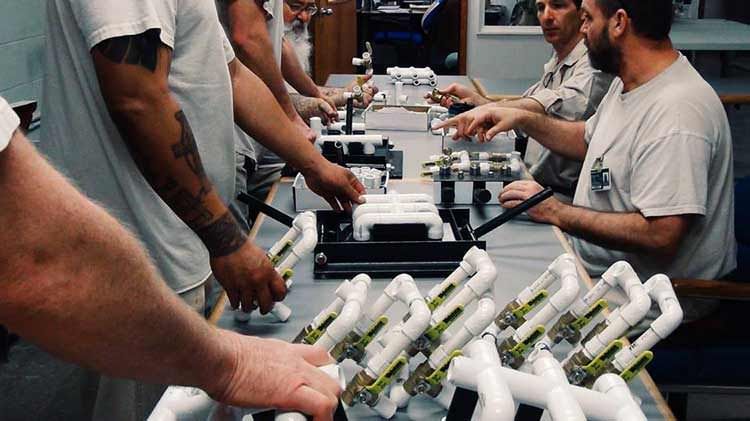Washington State Penitentiary Inmates Turn Energy to Lifesaving Water Systems
Published on by Water Network Research, Official research team of The Water Network in Technology
Inmate crews at the Washington State Penitentiary’s Sustainable Practices Lab (SPL) transform discarded and donated materials into usable items such as refurbished bicycles and furniture.
The lab’s latest venture is a new type of water filtration system that will be sent to developing countries plagued with waterborne illnesses.

Inmates at the Washington State Penitentiary’s Sustainable Practices Lab assemble
SafeTap water systems. The systems will be used to provide clean water to people
living in developing countries.
(Photo courtesy of Washington State Penitentiary Sustainable Practices Lab)
The SafeTap water filtration system is the brainchild of Andy Pierce, a former plumbing contractor who founded the California-based non-profit, Project 41. A volunteer humanitarian trip to Haiti following a deadly earthquake in 2010 inspired Pierce to start the organization. He’s taken subsequent trips to developing countries worldwide that often have hospitals and health clinics where water supplies are contaminated with harmful bacteria.
His humanitarian work involved installing large-scale water systems. While he was doing this, he came up with the idea of creating a small, portable water filter made from pipes, fittings and valves. The filters are stuffed with hundreds of tiny straws made of a hollow-fiber membrane that blocks bacteria. The SafeTap devices can be connected to existing water filtration systems to produce clean water. His invention can filter up to three gallons of water per minute.
“The Sustainable Practices Lab was just a huge answer to prayer,” Pierce said. “I was impressed with how well these guys have taken up the cause and keep pushing forward toward excellence and refining the (assembly) process. I’m really blown away.”
Impact of Partnership
The partnership between Pierce and the penitentiary resulted from a chance meeting at a national conference last year on environmental sustainability. The conference, held in Albany, Ore., had dozens of vendors from around the country. Pierce was one of the exhibitors.
Christopher McGill and Robert Branscum, two correctional specialists who oversee the penitentiary’s Sustainability Practices Lab, stopped at Pierce’s booth and learned about the SafeTap system.
At the time, Pierce was running his plumbing business by day and building SafeTap units at his home by night, but production time was slow, McGill said. “That’s when I told him about the Washington State Penitentiary’s Sustainable Practices Lab.”
For the past few months, a crew of nine inmates has been assembling SafeTap water filtration systems.
Project 41 funds the materials with donations from a private foundation, Pierce said.
Pierce ships the materials to the penitentiary. Inmates assemble the filtration systems. Once assembled, the systems are shipped to countries in need of clean water.
Inmates have assembled more than 150 SafeTap units. Thirty-five of the units have been sent to various countries, including eight to Puerto Rico to assist with Hurricane Maria relief efforts. A total of 115 units are heading to the island of Tortola, in the British Virgin Islands and more are headed to the East African Republic of Uganda and Ghana.
While the SafeTap systems are saving lives overseas, the partnership is transforming lives at the penitentiary.
Keith Parkins, 49, is serving a life sentence for multiple robbery convictions. He knows his actions in prison won’t have any impact on the length of his sentence, but the project has helped him find something meaningful behind bars.
“As a prisoner, I have always felt like I was a drain on society,” Parkins said. “But now, through the Sustainable Practices Lab and the water department, I am able to be a part of something that is literally saving lives throughout the world. In the process, it’s saving my life as well.”
By Rachel Friederich
Media
Taxonomy
- Drinking Water Security
- Treatment
- Treatment Methods
- Chemical Treatment
- Drinking Water Treatment
- Filtration
- Technology
- Filtration
- Drinking Water Managment
- Drinking Water
- Prisons